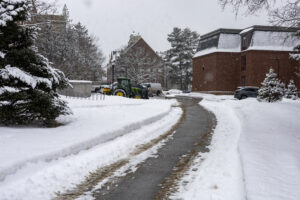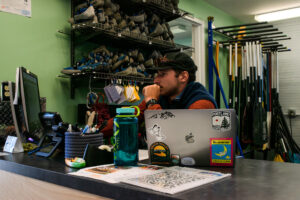Back in the summer of 2015, the University of Maine’s celebrated Women’s Resource Center was quietly and quickly erased from existence on campus, leaving a void of resources and safe spaces. The Student Women’s Association, backed by support from students and alumni alike, is waging a campaign to bring it back.
Sam Saucier, a third-year sociology and women and gender studies student and Lori Loftin, a third-year mathematics and women and gender studies student, are the co-presidents of the Student Women’s Association (SWA) and are spearheading the campaign to reinstate the Women’s Resource Center (WRC). They have heard students voice their displeasure at the lack of resources available to college women dealing with issues of pregnancy, sexual assault, domestic violence, women’s health and more and are determined to change the administration’s stance on putting women’s issues first.
“Most people are really surprised to hear that this is a problem and a fight that we’re still having, actually,” Loftin said, adding that they’ve experienced an outpouring of support for the campaign from UMaine students, faculty, student government, student groups, other universities and the Women and Gender Studies department. SWA has created a petition and a coalition document from other student groups on campus to try and emphasize the need for the center and both have garnered their cause a lot of attention.
The contradiction of the administration’s response to their campaign hasn’t been lost on Saucier. “You can find condoms all over campus,” she said, “but there’s not a ton of information on other forms of contraceptives or free menstrual products, like tampons and pads, which are a huge necessity.”
Jessie Carignan, a fourth-year sociology and women and gender studies student and active member of SWA, also believes the WRC is needed back on campus.
“Unfortunately this country has a very shameful and embarrassing attitude towards sex education and a lot of women come to college not knowing many crucial things about their own bodies, how to make healthy sex decisions and what services there are to offer. At the WRC, women can get all the answers, services and support they’ve been denied.”
Amber Hathaway, a physics Ph.D. students, has been at UMaine since 2008 and can remember all the benefits previous WRC provided students. “One of the most valuable resources it offered was the Safe Campus Project, which was a space for survivors of domestic violence and sexual assault,” she said. “The Safe Campus Project offered confidential counseling and helped put survivors in touch with the different local organizations that could help them through the recovery process. So if someone needed to talk to a counselor but didn’t want to report their experience they could. If they did want to report their experiences to the school or to police, or if they needed someone to go with them to the hospital after an assault, the Safe Campus Project would either help this individual directly or get them in touch with a community organization that could help.”
“I think it needs to be reinstated because the needs of the campus community that the WRC used to serve are no longer being met,” she said. “While the WRC offered many important services, I think the two services that it offered that we need the most are a resource center for survivors of sexual assault and domestic violence and a safe space for women and femmes on campus. The mandated reporting policy on campus infantilizes survivors by assuming that they are not competent enough to make the appropriate decision for themselves and it gives them even fewer people they can turn to.”
The University of Maine has a student body of over 11,000 students and all of the faculty (including student workers), are mandatory reporters, meaning if someone comes to them to talk about a sexual assault incident of any measure they are required to report it to law enforcement. According to Loftin and Saucier, the ideal WRC would have a staff member who is not a mandatory reporter to cater to survivors of sexual assault and domestic violence who need an outlet to talk to, but do not want to involve the police.
In addition, the WRC would ideally be a handicap accessible and centrally located space on campus, providing free menstrual products, information on sexual and reproductive health, information on healthy relationships, a safe space for women’s groups to meet and function out of and an overall environment of acceptance, understanding and support. The goal is to create a strong foundation for the WRC that can be improved on and adjusted in the years to come.
“About the only group on campus exempted from mandated reporting are the counselors at the Counseling Center,” Hathaway said, “but they’re already understaffed and as far as I’m aware they’re not specifically rape crisis counselors. There needs to be someone on campus who is not a mandated reporter who has the training and the availability to help survivors in whatever capacity they need.”
For anyone looking to get involved in the campaign, the Student Women’s Association meets weekly on Mondays at 7 p.m. in the Totman Room of the Union.









